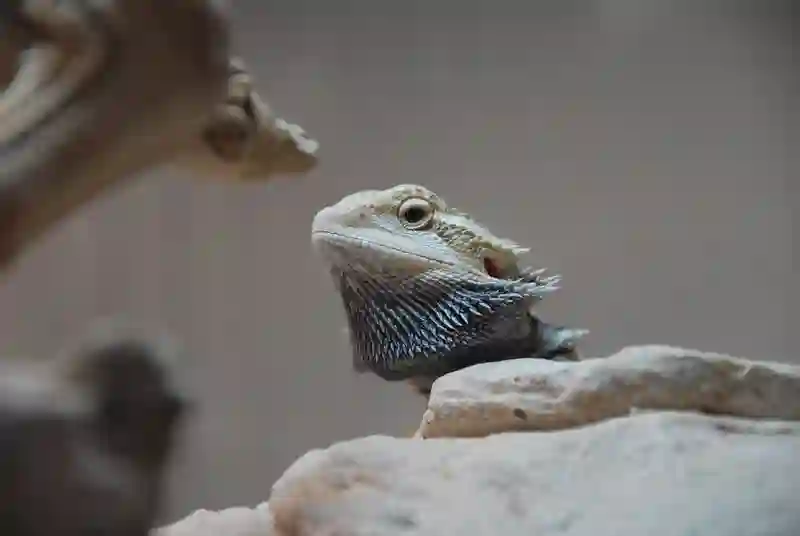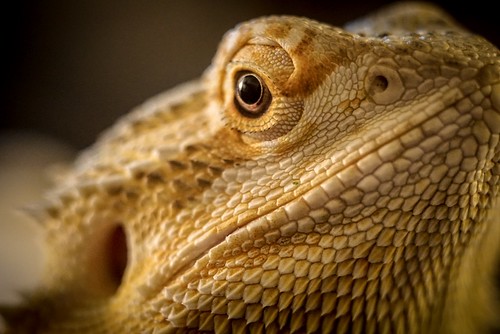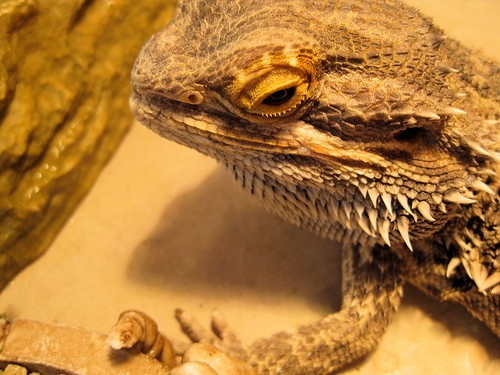Yes, bearded dragons can carry diseases, particularly Salmonella germs, which can be found in their droppings even if they appear healthy and clean.
These germs can spread to their bodies and their environment, potentially causing illness in humans who come into contact with them.
To minimize the risk of infection, it is essential to practice proper hygiene, such as washing hands thoroughly after handling or feeding bearded dragons, cleaning their enclosures regularly, and avoiding kissing or snuggling with them.
The Importance of Understanding Potential Health Risks
Even though owning a bearded dragon can be extremely rewarding, pet owners should be aware of the potential health risks associated with keeping one. The bearded dragon can contract diseases that can have serious consequences if not treated, just like any other animal or human being.
Infections of the respiratory system, gastrointestinal disorders like parasites or impaction (blockage), skin infections, and mite infestations are among the diseases that bearded dragons can carry.
When left untreated, these conditions can be uncomfortable or even life-threatening for your pet. We will take a closer look at these common diseases in the following sections to make sure you know the symptoms and how to treat them.
Common Diseases in Bearded Dragons
Bearded dragons are generally healthy animals when kept in a clean and well-maintained environment. However, like any other living creature, they are susceptible to diseases. It is essential to be aware of the common health issues that can affect them.
Parasites
Internal and external parasites are among the most prevalent health concerns for bearded dragons. Infestations can cause weight loss, lethargy, and even death if left untreated.
Common internal parasites include pinworms and tapeworms, whereas mites, ticks, and lice can infest their skin. Symptoms of parasite infections may vary depending on the type of parasite involved, but some common signs include loss of appetite, lethargy, diarrhea or constipation, and abnormal feces appearance or coloration.
Treatment typically involves medications prescribed by a veterinarian to eliminate the specific parasite affecting your pet. Regular cleaning of their enclosure is also essential to prevent re-infestation.
Respiratory Infections
Respiratory infections are another common health issue observed in bearded dragons. These infections usually occur due to poor hygiene conditions or incorrect temperatures in their enclosure.
Signs of respiratory infection include wheezing or whistling sounds during breathing along with coughing or discharge from eyes/nose/mouth. The treatment typically involves administering antibiotics under veterinary supervision as early as possible before it progresses into a severe pneumonia stage.
Metabolic Bone Disease (MBD)
Metabolic bone disease is another commonly observed health issue among captive reptiles such as bearded dragons. MBD occurs when there is a lack of proper calcium intake which leads to softening bones leading them towards fractures/deformities/dislocations. Symptoms include twitching limbs & muscle spasms due to muscle weakness accompanied by bowed legs/jaw deformities.
The treatment of MBD includes increasing the calcium content in their diet and providing full-spectrum UVB lighting for promoting Vitamin D synthesis in their skin. In severe cases, surgical treatment may be needed.
Keeping your bearded dragon healthy requires being knowledgeable about common health issues they may face. Regular check-ups with a veterinarian and maintaining a clean living environment can help prevent these issues or catch them early on for effective treatment.
Zoonotic Diseases:
Bearded dragons are warm-blooded animals that can potentially carry harmful zoonotic diseases. Zoonotic diseases are those that can be transmitted from animals to humans, and in some cases, vice versa. Pet owners should take necessary precautions to protect themselves and their pets from these diseases.
Explanation of Zoonotic Diseases and How They Can Be Transmitted:
Zoonotic diseases are caused by bacteria, viruses, parasites, or fungi that can be transmitted between animals and humans through direct contact or indirectly through infected surfaces or objects. Bearded dragons may carry a number of zoonotic diseases such as salmonella, campylobacteriosis, cryptosporidiosis, mycobacteriosis, and reptile-associated salmonellosis.
Specific Zoonotic Diseases That Bearded Dragons Can Carry:
Salmonella is a common bacterial infection that is found in the gastrointestinal tract of many reptiles including bearded dragons. Campylobacteriosis is another bacterial infection that can affect both humans and bearded dragons causing diarrhea, fever, abdominal pain, or cramping.
Cryptosporidiosis is a parasitic infection that causes watery diarrhea with abdominal pain. Mycobacteriosis is a serious bacterial infection that affects the respiratory and digestive systems in humans whereas reptile-associated salmonellosis causes fever, and diarrhea with blood or mucus in it.
Prevention Measures to Protect Both The Pet And Owner:
Keep your hands clean after handling your bearded dragon or touching any surfaces or objects it has touched if you don’t want to get infected with zoonotic diseases; don’t kiss it or put your hand near its mouth; clean its cage regularly; keep kids around it under supervision; and separate it from other pets, especially those that are prone to infections like cats/dogs.; have it receive regular veterinary care; and lastly, do not feed it raw or undercooked meat.
Preventative Measures
Tips for Maintaining a Healthy Environment for Your Bearded Dragon
In order to keep your bearded dragon healthy and free from diseases, it’s important to maintain a clean and healthy environment. Start by providing the right type of enclosure that is large enough to accommodate your pet.
Make sure the enclosure has proper lighting, heating, and ventilation. Keep the temperature at around 85-90 degrees Fahrenheit during the day and 70-75 degrees Fahrenheit at night.
Bearded dragons also require UVB lighting, so make sure to provide a UVB bulb that is appropriate for your pet’s size. It’s important to keep the enclosure clean by spot-cleaning daily and doing a deep cleaning once a week.
Remove any uneaten food or feces promptly as they can attract bacteria and insects that can harm your pet. Use a reptile-safe disinfectant when cleaning the enclosure, but always rinse well with water after using any cleaning products.
Proper Hygiene Practices for Handling and Caring for Your Pet
Good hygiene practices are crucial in preventing the spread of diseases from bearded dragons to humans or other pets in the household. Always wash your hands thoroughly with soap and warm water before handling your bearded dragon or touching anything in its enclosure.
Avoid holding your bearded dragon too tightly or forcefully as this can cause stress or even injury. When handling them, support their body with one hand under their belly while gently holding their head with the other hand.
Be careful about what you feed your bearded dragon as some insects or vegetables may carry harmful bacteria that can make them sick. Offer only fresh fruits and vegetables that are safe for reptiles, such as kale, collard greens, carrots, apples, etc., along with appropriate feeder insects such as crickets or mealworms.
Keeping your bearded dragon healthy and free from diseases requires a combination of proper care, hygiene practices, and regular check-ups with a veterinarian. By following these tips, you can ensure that your pet remains healthy and happy for years to come.
Conclusion
Recap of key points regarding the potential health risks associated with owning a bearded dragon
After reviewing the common diseases that bearded dragons can carry and the zoonotic risks associated with owning them, it is crucial to understand the potential health risks associated with these pets. Bearded dragons are beloved pets and can bring joy to their owners. However, it is important to remember that they are still animals and require proper care to ensure their health and well-being.
It’s important to be aware of any symptoms of illness or abnormal behavior in your pet, as early detection can improve treatment options significantly. Ensuring that your pet receives proper nutrition, hydration, and lighting conditions are vital steps in preventing diseases.
Importance of regular check-ups with a veterinarian
Bearded dragons require specialized veterinary care, even if they appear healthy. Regular check-ups with an experienced exotic animal vet can help catch any illnesses or issues before they become serious problems.
During these check-ups, the vet will perform a comprehensive examination of your pet’s overall health, including weight checks, blood tests, and fecal analyses for parasites, or other indicators of ill health. While there are some costs associated with regular veterinary visits for your bearded dragon, it’s essential to prioritize their well-being by scheduling routine check-ups.
This also includes discussing any questions or concerns you have about nutrition or the environment that could impact your pet’s overall health. While owning a bearded dragon comes along with some potential health risks; there is no reason why you cannot enjoy having one as a companion animal.


